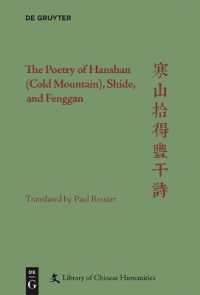- ホーム
- > 洋書
Full Description
The AIDS epidemic soured the memory of the sexual revolution and gay liberation of the 1970s, and prominent politicians, commentators, and academics instructed gay men to forget the sexual cultures of the 1970s in order to ensure a healthy future. But without memory there can be no future, argue Christopher Castiglia and Christopher Reed in this exploration of the struggle over gay memory that marked the decades following the onset of AIDS.
Challenging many of the assumptions behind first-wave queer theory, If Memory Serves offers a new perspective on the emergence of contemporary queer culture from the suppression and repression of gay memory. Drawing on a rich archive of videos, films, television shows, novels, monuments, paintings, and sculptures created in the wake of the epidemic, the authors reveal a resistance among critics to valuing—even recognizing—the inscription of gay memory in art, literature, popular culture, and the built environment. Castiglia and Reed explore such topics as the unacknowledged ways in which the popular sitcom Will and Grace circulated gay subcultural references to awaken a desire for belonging among young viewers; the post-traumatic (un)rememberings of queer theory; and the generation of "ideality politics" in the art of Félix González-Torres, the film Chuck & Buck, and the independent video Video Remains.
Inspired by Alasdair MacIntyre's insight that "the possession of a historical identity and the possession of a social identity coincide," Castiglia and Reed demonstrate that memory is crafted in response to inadequacies in the present—and therefore a constructive relation to the past is essential to the imagining of a new future.
Contents
Contents
Introduction: In the Interest of Time
1. Battles over the Gay Past: De-generation and the Queerness of Memory
2. For Time Immemorial: Marking Time in the Built Environment
3. The Revolution Might Be Televised: The Mass Mediation of Gay Memories
4. Queer Theory Is Burning: Sexual Revolution and Traumatic Unremembering
5. Remembering a New Queer Politics: Ideals in the Aftermath of Identity
Acknowledgments
Notes
Bibliography
Index






